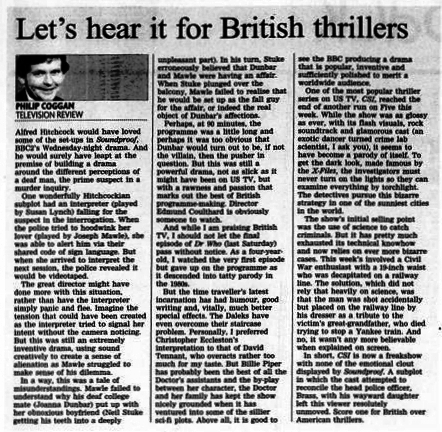Let's hear it for British thrillers
- Publication: Financial Times
- Date: 2006-07-15
- Author: Philip Coggan
- Page: 13
- Language: English
Alfred Hitchcock would have loved some of the set-ups in Soundproof, BBC2's Wednesday-night drama. And he would surely have leapt at the premise of building a drama around the different perceptions of a deaf man, the prime suspect in a murder inquiry.
One wonderfully Hitchcockian subplot had an interpreter (played by Susan Lynch) falling for the suspect in the inter-rogation. When the police tried to hoodwink her lover (played by Joseph Mawle), she was able to alert him via their shared code of sign language. But when she arrived to interpret the next session, the police revealed it would be videotaped.
The great director might have done more with this situation, rather than have the interpreter simply panic and flee. Imagine the tension that could have been created as the interpreter tried to signal her intent without the camera noticing. But this was still an extremely inventive drama, using sound creatively to create a sense of alienation as Mawle struggled to make sense of his dilemma.
In a way, this was a tale of misunderstandings. Mawle failed to understand why his deaf college mate (Joanna Dunbar) put up with her obnoxious boyfriend (Neil Stuke getting his teeth into a deeply unpleasant part). In his turn, Stuke erroneously believed that Dunbar and Mawle were having an affair. When Stuke plunged over the balcony, Mawle failed to realise that he would be set up as the fall guy for the affair, or indeed the real object of Dunbar's affections.
Perhaps, at 90 minutes, the programme was a little long and perhaps it was too obvious that Dunbar would turn out to be, if not the villain, then the pusher in question. But this was still a powerful drama, not as slick as it might have been on US TV, but with a rawness and passion that marks out the best of British programme-making. Director Edmund Coulthard is obviously someone to watch.
And while I am praising British TV, I should not let the final episode of Dr Who (last Saturday) pass without notice. As a four-year-old, I watched the very first episode but gave up on the programme as it descended into tatty parody in the 1980s.
But the time traveller's latest incarnation has had humour, good writing and, vitally, much better special effects. The Daleks have even overcome their staircase problem. Personally, I preferred Christopher Eccleston's interpretation to that of David Tennant, who overacts rather too much for my taste. But Billie Piper has probably been the best of all the Doctor's assistants and the by-play between her character, the Doctor and her family has kept the show nicely grounded when it has ventured into some of the sillier sci-fi plots. Above all, it is good to see the BBC producing a drama that is popular, inventive and sufficiently polished to merit a worldwide audience.
One of the most popular thriller series on US TV, CSI, reached the end of another run on Five this week. While the show was as glossy as ever, with its flash visuals, rock soundtrack and glamorous cast (an exotic dancer turned crime lab scientist, I ask you), it seems to have become a parody of itself. To get the dark look, made famous by the X-Files, the investigators must never turn on the lights so they can examine everything by torchlight. The detectives pursue this bizarre strategy in one of the sunniest cities in the world.
The show's initial selling point was the use of science to catch criminals. But it has pretty much exhausted its technical knowhow and now relies on ever more bizarre cases. This week's involved a Civil War enthusiast with a 19-inch waist who was decapitated on a railway line. The solution, which did not rely that heavily on science, was that the man was shot accidentally but placed on the railway line by his dresser as a tribute to the victim's great-grandfather, who died trying to stop a Yankee train. And no, it wasn't any more believable when explained on screen.
In short, CSI is now a freakshow with none of the emotional clout displayed by Soundproof. A subplot in which the cast attempted to reconcile the head police officer, Brass, with his wayward daughter left this viewer resolutely unmoved. Score one for British over American thrillers.
Disclaimer: These citations are created on-the-fly using primitive parsing techniques. You should double-check all citations. Send feedback to whovian@cuttingsarchive.org
- APA 6th ed.: Coggan, Philip (2006-07-15). Let's hear it for British thrillers. Financial Times p. 13.
- MLA 7th ed.: Coggan, Philip. "Let's hear it for British thrillers." Financial Times [add city] 2006-07-15, 13. Print.
- Chicago 15th ed.: Coggan, Philip. "Let's hear it for British thrillers." Financial Times, edition, sec., 2006-07-15
- Turabian: Coggan, Philip. "Let's hear it for British thrillers." Financial Times, 2006-07-15, section, 13 edition.
- Wikipedia (this article): <ref>{{cite news| title=Let's hear it for British thrillers | url=http://cuttingsarchive.org/index.php/Let%27s_hear_it_for_British_thrillers | work=Financial Times | pages=13 | date=2006-07-15 | via=Doctor Who Cuttings Archive | accessdate=8 February 2026 }}</ref>
- Wikipedia (this page): <ref>{{cite web | title=Let's hear it for British thrillers | url=http://cuttingsarchive.org/index.php/Let%27s_hear_it_for_British_thrillers | work=Doctor Who Cuttings Archive | accessdate=8 February 2026}}</ref>
